Doom Coalition 1
Written By: John Dorney, Matt Fitton, Marc Platt, Edward CollierDirected By: Ken Bentley
Cast
Paul McGann (The Doctor), Nicola Walker (Liv Chenka), Hattie Morahan (Helen Sinclair), Robert Bathurst (Padrac), Caroline Langrishe (Lady Farina), Bethan Walker (Kiani), Ramon Tikaram (Castellan), David Yelland (Walter Pritchett), John Woodvine (Galileo Galilei), Harry Myers (Cleaver), Esther Hall (Virginia), Gunnar Cauthery (Cavalli), Ewan Bailey (Count Licori/Father Locke/Orbs), Matthew Cottle (Paine) and Mark Bonnar as The Eleven - with a special appearance by Sylvester McCoy (The Seventh Doctor)
In February I was fortunate to be present at Big Finish day 6. The prospect was an intriguing one, but the one thing that hadn’t crossed my mind was the thought of exclusive announcements. During one of the main panels discussing Big Finish as a company, with a Q and A session included, it was announced that there would be a sequel to the unreleased Dark Eyes 4. The sequel was to be entitled “Doom Coalition” but no other details were revealed.
Fast forward to post-Dark Eyes 4 and Doom Coalition 1 is now released. Listening to the trailer I wasn’t entirely sure what to think, other than that seeing Liv Chenka and Paul McGann’s Doctor would most likely be worth the few months of waiting. The plot seemed to be uncertain from the brief sample we had, in comparison to its predecessor where you could at least make educated guesses as to what might transpire.
To avoid spoilers, I will simply give my impression of the four stories and how they interweave in a similar fashion to the review of Dark Eyes 4.
1. The Eleven
For those who read the cast list, you might be forgiven for thinking that Sylvester McCoy’s seventh Doctor might be limited to an appearance that doesn’t add much to the character. However, it actually sets up the whole of the box set with a powerful confrontation between The Doctor’s seventh incarnation and an original villain, known only as The Eleven. This powerful Time Lord criminal describes himself as having “an affliction”, demonstrated by the seamless switching between multiple personalities, apparently from his various regenerations. For the first story in this collection, the voice acting, sound design and music are all of the quality standards that are expected by Big Finish, meaning you will have little difficulty in conjuring up any of the settings, people or situations created. Of particular note is the aforementioned Eleven, who in spite of the fact he is played by two separate people, there is no obvious break in consistency.
The ending of this episode, whilst potentially seeming anticlimactic, sets itself up well to continue into the next story. In spite of the action packed ending, the links may not be anywhere near as clear cut as the structure might have you believe.
2. The Red Lady
Two men enter a room containing a collection of artefacts all left by an extremely focused individual, though the focus is not initially obvious. This introduction serves to create the intrigue necessary to carry the plot forward, with the references to the culture of the time in which The Doctor and Liv find themselves also being of interest. Here is where the references and prior knowledge of the Dark Eyes saga, in particular Dark Eyes 4, will be of assistance in unravelling what might seem at first to be a confusing set of unintelligible references within the first 10 minutes. However, those who don’t know the prequels very well or at all will be pleased to learn that future references are subtle and underhand, with the cast handling the dialog, including the comedic moments, with the utmost deftness. The plot thickens as Liv and The Doctor investigate suspicious activities surrounding the collection, with the fact that the locations are few and far between making for an almost claustrophobic and fitting sense of urgency. The horror themes of the latter half of this episode really shine through the actors’ delivery and the Red Lady’s presence is ominous enough to create a sense of dread at what might transpire. Unfortunately, whilst I understand the reason for the vocal effect employed to mask the message near the end of the episode, it is far too distorted for it to be even remotely intelligible apart from the references from the cast. This only serves to lessen the sense of intrigue that it attempts to create.
3. The Galileo Trap
Florence in 1639 is conjured up with surprising brilliance and the “alien behemoth” from the synopsis of this episode is also startlingly deadly in its presentation. The plot of this episode does take a while to come together, with at least 2 interlinking threads that eventually convene into a well-conceived and mysterious link to The Eleven. The cast, new members and old alike, handle their parts well, with the alien voices and delivery being very much a key area of the episode’s prowess.
4. The Satanic Mill
To use a time old phrase from Doctor Who’s history, “the moment has been prepared for”. However, whilst the pieces are in place for The Doctor’s confrontation with The Eleven, they do not come together until near the end of the story. The voice acting continues to be of the highest standards, with the emotionally charged deliveries only seeking to add to the events leading to the conclusion of this first entry in the Doom Coalition series. However, the fate of The Eleven is left amongst other questions that will surely be answered in the sequel.
In conclusion, Doom coalition opens up a number of new areas to explore with the companions and cast who join McGann’s doctor in this 4 story set. With the sound design and non-invasive score being well thought out, it leaves me as a fan of the Dark Eyes Saga wondering just how far the well-known Time Lord’s eighth incarnation will go to stop The Eleven’s machinations and save not just earth, but most likely the universe as well.
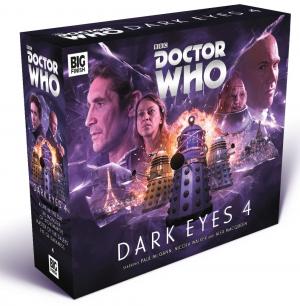
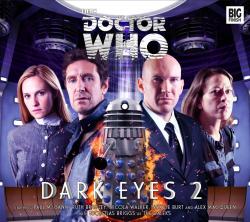
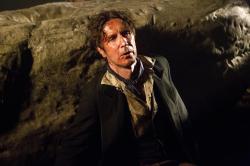
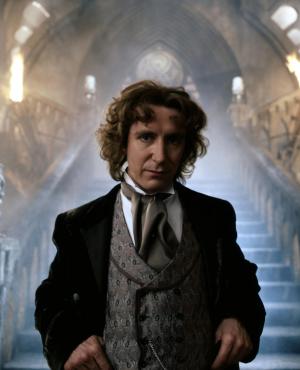 For the previous screenings in the British Film Institute’s monthly Doctor Who 50th anniversary events, there has been some degree of choice for the organisation in which story it selects to celebrate the era of each particular Doctor. While it’s true that every era of the show has a small gaggle of stories held up as classics by a large portion of fandom, there have still always been options. Not so, however, for
For the previous screenings in the British Film Institute’s monthly Doctor Who 50th anniversary events, there has been some degree of choice for the organisation in which story it selects to celebrate the era of each particular Doctor. While it’s true that every era of the show has a small gaggle of stories held up as classics by a large portion of fandom, there have still always been options. Not so, however, for 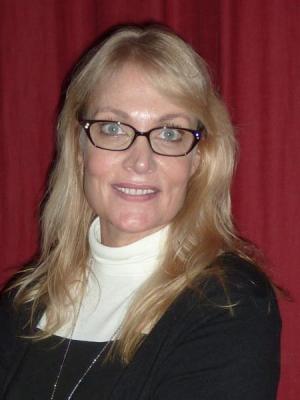 Indeed, for a production that was being pulled in so many different directions – by the BBC, by the Fox Network who were broadcasting it in the US, by Universal who were producing it, by
Indeed, for a production that was being pulled in so many different directions – by the BBC, by the Fox Network who were broadcasting it in the US, by Universal who were producing it, by 






